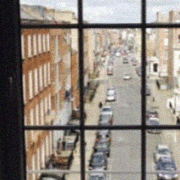
Making health equity a reality through research, education, policy and practice
Original Article
Bru Aimsir – bringing rough sleepers in from the cold

Before...

After...
A year on from the death of Jonathan Corrie on Molesworth Street, I was fortunate enough to witness first-hand what Dublin City Council (DCC) and partners were doing to try to prevent fatalities and/or serious harm from cold weather temperatures.
In October the DCC contracted Crosscare to manage a new accommodation which would provide shelter from the elements for the winter months. Crosscare with much experience of providing such services has a reputation in the sector for quality service provision particularly when it comes to the physical environment. Crosscare proposed to provide much more than a bed for the night, engaging its assertive outreach division to work with those using the facility, whom it refers to as ‘guests’. These guests would be linked in with other support services to move them towards exiting homelessness. Crosscare invited our GP training programme NDCGP to be involved in providing health care for the guests of the new accommodation.
On October 28th after the first planning meeting with DCC and Crosscare, we went to see the new facility. The old cash and carry was hard to imagine as anything but the huge a warehouse that it now was. However the can-do attitude and level of commitment espoused by DCC and Crosscare encouraged me to believe that the facility would indeed be ready for the worst of the cold weather. This it was, only three weeks later.
On Nov 20, 2015 the new facility named ‘Bru Aimsir’ opened. It represents the core service of the Annual Cold Weather Initiative (CWI) for this winter[i]. The first few nights it operated with only 30 beds as heating issues for part of the building were ironed out. Within a week it was providing 100 emergency beds for homeless people at risk of rough sleeping. Within a few short weeks the ‘warehouse’ was transformed into a very attractive, quality facility that could offer not only shelter but a light meal, healthcare and a range of support services. Showers and laundry facilities are also available. Voluntary groups are participating in the delivery of social and recreational activities.


Original Articles
Reseach
Education
News & Views
Conferences
Our GP training Programme with Safetynet established a GP clinic on December 1st. One GP and one GP Registrar provide the service one morning per week. This has been funded by the HSE Social Inclusion. The GP Registrars from the NDCGP also provide a clinic service on Thursday evenings. People who are homeless are known to have higher rates of medical and psychiatric illness, and this clinic provides an easily accessible route to medical care. The clinics have been well attended with patients coming with a range of conditions. Patients have presented most commonly with skin conditions including skin infections, abscesses, wounds and burns. The next most common complaints have been respiratory conditions including upper and lower respiratory tract infections, pneumonia and asthma. Chronic conditions such as diabetes and hypertension have also been managed and psychiatric issues included possible psychosis and anxiety.
A novel part of the service is the provision of naloxone for people at risk of overdose. This is provided in collaboration with the HSE naloxone demonstration project. n the new year the clinic plans to provide vaccination to the cohort accessing Bru Aimsir, provide hep c check and expand the clinic sessions to two mornings per week and one evening. Depaul plan to provide nursing sessions in the coming week.
The importance of the health care provision to this vulnerable group cannot be overstated. The PHE research report Homelessness: An Unhealthy State demonstrates the huge burden of ill-health among this population. Poor physical and mental can be both a contributing cause to homelessness as well as a consequence. Dealing with people’s health issues early represents an opportunity to prevent decline, promote wellbeing and can help people move towards exiting homelessness. Bru Aimsir through gathering some of the most vulnerable people in one place offers a focal point for support services including healthcare, to work with people to move them to a less vulnerable situation on a case-by-case basis.

While it’s true that emergency night-by-night accommodation is far from ideal in that it provides no long-term solution for the homeless, the establishment of this facility has undoubtedly removed the need to sleep out in the cold on the streets for many. What’s more, the service not only provides a clean, safe alternative but does so in a manner that is respectful of its guests, doing everything possible to help them move out of homelessness. The collaborative and efficient manner in which it was established with the guest’s needs always to the fore is an example of best practice.
Contributed to Health E Quality Online by Dr Fiona O’Reilly (PHE) 19.12.15: primarycare@healthequity.ie
Please see Ciarán D’Arcy’s article in the Irish Times about this initiative.
[1] The 100 single beds are in addition to a further delivery of 75 ring-fenced beds across all homeless services in Dublin region 20 single beds (extreme cold weather service) 37 family units 18 couple units. All referrals and bookings into the service, are managed by Dublin City Council’s Homeless Central Placement Service (1800 707 707).






